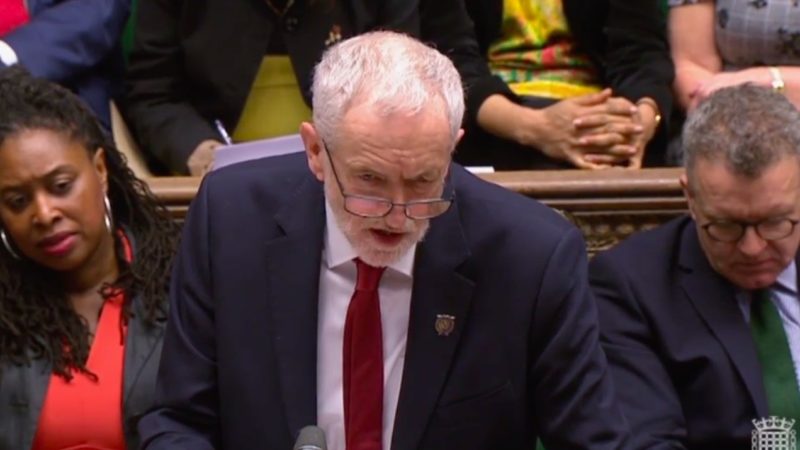
1. Theresa May has set herself a deadline. (Again.)
The most significant thing to come out of PMQs today was right at the beginning. Theresa May kicked off the session by announcing that she had written to Donald Tusk with an Article 50 extension request. However, contrary to the extension motion passed last week, the PM confirmed that she has only asked for a short delay to Brexit.
“As Prime Minister, I am not prepared to delay Brexit any further than 30th June.” That was the key quote. It implies that she will put an end to her premiership if a longer extension is necessary, either due to the EU’s response to her letter or because MPs do not agree a deal in the next few months. (It’s worth noting that she may not have had a choice in that deadline anyway.)
What does this mean for Labour? If it backed and built support for a longer extension, it could force Theresa May out of office. But there is a significant risk that this would topple an incompetent, unpopular Tory leader in exchange for a shiny newbie who favours ‘no deal’.
2. Jeremy Corbyn is willing to compromise.
As discussed in this morning’s LabourList daily email, the Labour leader has made clear that he is willing to compromise on Brexit: first, by agreeing to whip for the Kyle/Wilson plan that would see MPs allow May’s deal to pass on the condition it is put to a ‘confirmatory ballot’; now, by warming to Common Market 2.0.
Corbyn emphasised these moves at PMQs today, saying: “In an effort to break the deadlock, I’ve held meetings with members all across the House.” He informed us that tomorrow he will meet with EU Prime Ministers and officials in Brussels.
3. Theresa May is still refusing to compromise.
Corbyn’s offer of a meeting was ignored by the Prime Minister, who simply called his invitation “a bit rich” and noted that other opposition leaders do not want to deliver Brexit (i.e. meeting with them is a waste of time). Asked whether she would drop her red lines and compromise, May refused to answer.
4… and she’s blaming parliament for the Brexit chaos.
Theresa May, taking responsibility? Not a chance. Listing the options rejected by the Commons – another referendum, no deal, Labour’s deal, a customs union (she left out her deal) – the PM concluded: “It’s time this parliament faced the consequences.” But apparently not time she accepted the consequences, which are that something about her deal needs to change.
May later went on to shift the blame and insult MPs further. “This House has indulged itself on Europe for too long,” she claimed, without a hint of self-awareness. Corbyn said this was disrespectful of the democratic process, while Labour MPs naturally made their outrage heard.
The PM’s message might make sense as one worth sending to the ‘Bored of Brexit’ electorate, but she is addressing the Commons. It is remarkable to watch her repeatedly irritate Labour MPs, from whom she needs dozens of votes when the deal is next brought back.
5. Jeremy Corbyn is still pushing for a general election.
Rounding off his final PMQs contribution, Corbyn asked: “If the Prime Minister cannot get changes to her deal, will she give the people a chance to reject the deal and change the government?” Optimistic ‘people’s vote’ supporters might hope he is referring to another referendum, but it’s the idea of a general election that elicits enthusiasm from the Labour leader.
6. Calls are growing for ‘indicative votes’.
The government must hold a series of ‘indicative votes’, Tory grandee Ken Clarke said in the questions that followed the Corbyn-May sparring match. “Just allow the indicative votes that others have put forward,” Labour’s Yvette Cooper also advised, adding: “In the national interest, I beg this Prime Minister to think again.”
The Prime Minister didn’t deviate from her standard replies, which now involve blaming parliament for voting down her deal, but the day of indicative votes – which would allow MPs to freely choose their preferred Brexit options and establish the most supported path – is getting closer.



More from LabourList
Frank Field and David Marquand: Tributes flow in to ‘social justice crusader’ and ‘giant of social democracy’
‘National flags and identity can be inclusive – we’re right to embrace them’
Revealed: Claims of bullying, misogyny and harassment in Young Fabians